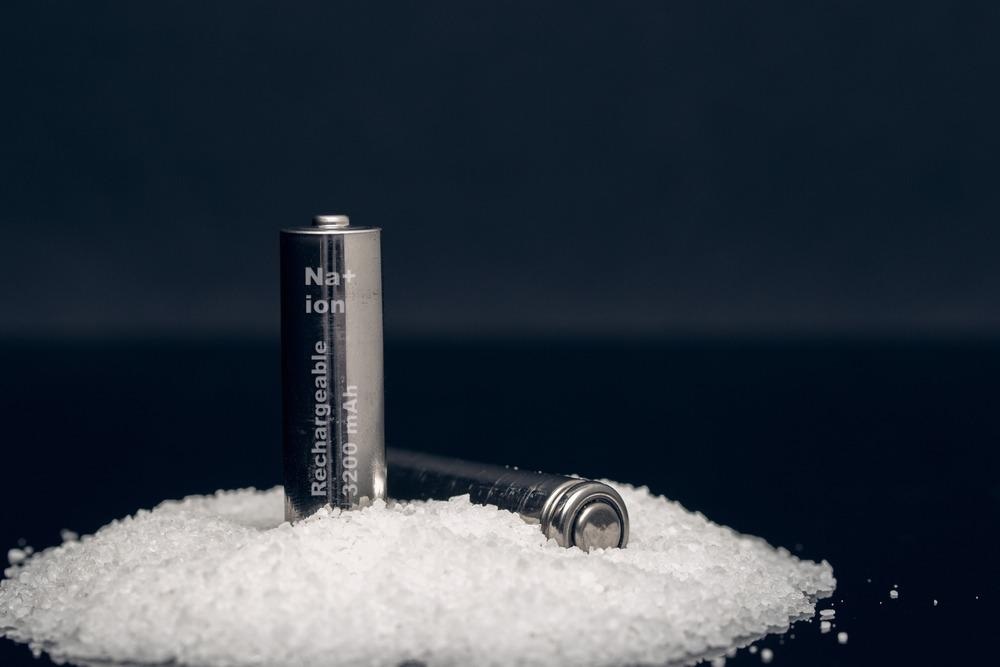.jpg) By Susha Cheriyedath, M.Sc.Nov 15 2021Reviewed by Skyla Baily
By Susha Cheriyedath, M.Sc.Nov 15 2021Reviewed by Skyla BailyIn a paper published in the journal Energy Storage Materials, a group of researchers reported their analysis of elemental sulfur, cobalt sulfide, and ionic liquid mixed anode as an alternative to nickel-cobalt alloy-based anodes for an aqueous sodium-ion rechargeable battery.

Study: An elemental sulfur/CoS2- ionic liquid-based anode for high-performance aqueous sodium-ion batteries. Image Credit: gcarnero/Shutterstock.com
Rechargeable batteries are becoming the most prominent choice among energy storage solutions and are satisfying the blooming development of portable electronic appliances, electric vehicles, industrial energy backup, and renewable energy storage. They are broadly classified based on the type of charge-carrying ion, the electrode materials, and the type of electrolyte being used.
Sodium-Ion Battery or Lithium-Ion Battery, Which is Better?
Over the past few decades, lithium-ion batteries (LiBs) are dominating the global market because lithium is a lightweight and high-energy-density element, almost double that of sodium (Na). High energy density means more energy storage within a relatively compact size and longer run time.
However, sodium has drawn the attention of many researchers because of its high availability, lower cost, the environmentally benign extraction process, higher stability, wider operating temperature range, and non-flammability. Lithium is a scarce rare earth mineral with a high cost; only a few countries control the supply chain, unstable at higher temperatures, and is flammable.
When it comes to stationary applications like large renewable energy storage, critical appliances, and high-value assets like data centers, where stability, safety, and bulk cost reduction are more important than compact size, portability, and high energy storage capacity, Na-ion batteries are more desirable.
Sodium-Sulfur-Based Electrode or Sodium-Nickel-Cobalt-Based Electrode, What to Choose?
Sulfur (S) has a very high energy density in comparison to that of nickel (Ni) and cobalt (Co). Presently, some amount of cobalt is used in LiB electrodes to impart stability when ions are diffused from or diffused onto them periodically. From the viability point of view, sulfur can compensate for the loss of energy density when Na-ion is used instead of Li-ion. Also, sulfur is a cheaper and high availability alternative to nickel- and cobalt-based electrode materials.
More on Battery Technology - Improving the Rate Performance of Hard Carbon for Use in Batteries
However, sulfur has not been able to make its way into the current market of rechargeable batteries because of the ‘shuttle’ effect of polysulfides. It is responsible for the progressive leakage of the active material from the cathode due to the dissolution of long-chain polysulfides in non-aqueous electrolytes, resulting in low coulombic efficiency, self-discharging, and low life cycle of the battery.
Various research aims to suppress this dissolution of polysulfides.
Aqueous or Non-Aqueous Electrolyte?
Aqueous electrolytes are more environmentally friendly than non-aqueous electrolytes. The solubility, as well as the redox chemistry of sulfur and polysulfides in aqueous electrolytes, is different from the non-aqueous electrolyte.
How Sodium Ion Batteries Stacks Up Against Li Ion Batteries
Video Credit: The Tesla Domain/Youtube.com
Longer-chain polysulfides are insoluble in aqueous electrolytes, but the discharge product Na2S and short-chain polysulfide are highly soluble in water, so the redox kinetics is faster in water compared to non-aqueous electrolytes where the kinetics is slow because of insoluble discharge products.
What Did the Researchers Find?
The researchers used 70 % elemental sulfur along with CoS2 and 1-butyl-3 methylimidazolium o,obis(2-ethylhexyl) dithiophosphate (BMIm-DDTP) ionic liquid (IL) as anode (S@CoS2-IL) for aqueous rechargeable sodium-ion sulfur batteries (ARSSB) in 2 M aq. Na2SO4 electrolyte.
S@CoS2-IL showed an outstanding capacity of 977 mAhg-1 at 0.5°C with a stable cycling performance over 100 cycles with high capacity retention at 2 °C with 100% of coulombic efficiency. The synergy between highly active CoS2 and BMIm-DDTP IL from the dynamic
coordination of dithiophosphate with CoS2 offers easy access for polysulfides anchoring and fast reaction kinetics which in turn effectively suppresses the dissolution of discharge polysulfides. Moreover, BMIm-DDTP IL serves as a binder thus eliminating the conventional PVDF binder providing the concept of the binder-free anode.
The synergy between IL and CoS2 offers both hydrophobic protection and efficient polysulfide conversion and thus preventing the reaction of polysulfides with water to form H2S.
Reference:
Kumar, M. et al., An elemental sulfur/CoS2- ionic liquid-based anode for high-performance aqueous sodium-ion batteries, Energy Storage Materials (2021): https://www.sciencedirect.com/science/article/pii/S2405829721005043?via%3Dihub
Disclaimer: The views expressed here are those of the author expressed in their private capacity and do not necessarily represent the views of AZoM.com Limited T/A AZoNetwork the owner and operator of this website. This disclaimer forms part of the Terms and conditions of use of this website.